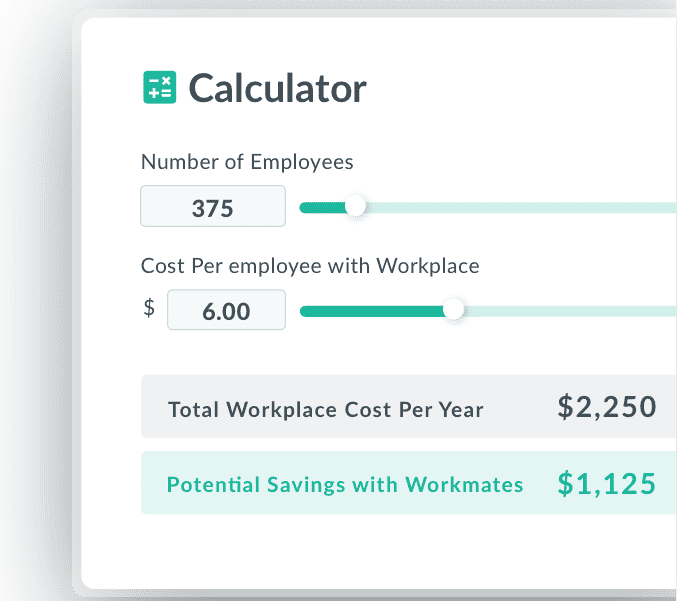In March 2020 the United Kingdom entered a National Lockdown as a result of the Global Covid- 19 Pandemic, and since that point, the employment industry has not been the same due to the requirement for social distancing. According to Statista, in June 2021 44% of 30-39-year-olds were still working remotely and a lot of companies have taken advantage of this change.
In this blog, we will discuss how best to manage a remote team, as well as how to help your employees adjust to these changes and how to monitor their workloads.
Find Out How Much You Can Save by Switching to Workmates.
and save upwards of 60%

Set Your Expectations from the Offset:
The best place to start in terms of managing remote workers is to ensure that everyone has the same understanding of the company’s policy and what is expected of them when working from home. Whether it involves deadlines, how to adapt to using video calling platforms, or even how to structure their day, your employees need strong management guidelines in place to provide them with confidence to work from home and time to prepare for the significant change to the working environment.
Due to working from home is such a change from the norm, there are bound to be questions from your employees and it is HR’s job to support them with any queries and worries they may have.
Schedule Daily Check-Ins:
Scheduling daily check-ins can be beneficial to both the employee and the employer with regards to working from home, but the usual email, Slack, or Microsoft Teams message will not suffice. Video calling has catapulted into success on the back of the global pandemic because it is as close as you can get to real-life interaction without physically interacting.
Using a video call program to host check-ins with your employees can help maintain trustworthy and honest communication between the team. A 10-minute video call provides you with peace of mind because you can directly ask how your employee is keeping up with deadlines, what their progress is with a particular project, and even how they are coping working remotely.
Resources:
Ensuring your colleagues have the correct resources to adapt to working from home is an important part of managing a team remotely. It can be as simple as making sure they each have working headphones to use on their video call meetings to maintain employee engagement. This is important with regards to maintaining team morale and motivation because small barriers to working, such as not having the correct equipment, can cause unnecessary stress and hinder progress on a project. Ultimately you need to ensure that it is as easy as possible for your employees to do their jobs from home.
Avoid Micromanaging:
The best managers learn to allow their employees to find their best working style. When adapting to working from home, along with following your company policies, your employees do not want to feel like they are being monitored every 5 minutes because that would not be the case if they were in the office.
Allowing flexibility in working style or even how an employer prefers to record their progress can help them to feel less micromanaged and more independent. For example, you could set a guideline in place that you want an email by the end of every week with progress, issues and plans for the following week from each of your employees. But, you could give them the choice whether they want to do that in smaller emails throughout the week, or one big email at the end of the week. As long as you get a record of their progress throughout their working hours, how and when they do that before the deadline does not really affect you, but gives them a little more flexibility.
Common Issues With Remote Working:
Working from home comes with a series of common issues that, if preempted, can be managed successfully:
-
Technology issues are not being fixed very quickly
-
Loneliness from lack of interaction with colleagues
-
Misconstrued communication between the team
-
Reduced team morale
-
Work-life balance
-
Working around children
-
Wifi connection
-
Structuring your day
-
Distractions
All of these common issues if not managed properly can have a significant impact on the productivity of your team members therefore it is important to prepare for these situations to arise to help them.
How Employers Can Help Remote Working Employees
One of the best ways to help your remote working employees is to create a welcoming, honest environment where they feel they can voice their concerns just as though they were working face to face. Being stuck in your home with your problems every day can have a significant effect on mental health and stress levels so if a remote employee feels as though they can talk to somebody in management this can help them offload any problems.
Whether it's technical issues, struggling to meet deadlines, or even a decline in mental health, the first step to a solution is communicating it to the correct people, and without the strong foundations of a good colleague relationship, it will be very hard to solve these problems.
How to Help Employees Adjust to Remote Working
It is highly likely that at least someone in your team will not adapt well to working from home and you need to be prepared for this possibility. A good strategy for managing people in this scenario is to ask the employee to explain what their main issues are and ask them what they think would make it better. Put the ball in their court.
This helps because it shows you are willing to listen to them individually and work with them to find a solution which in itself is already helping the employee because they feel less alone with their worries.
For example, you may have an older employee who is struggling to adapt to the new video meeting technology and they are feeling worried about not being able to keep up with everyone. Without having a trusting relationship, they would not have opened up to you about this issue but now that you know, you could potentially offer them some training on how to use that particular program which consequently will make their experience working from home a little easier.
How to Monitor Employees when Working from Home
There are many ways to monitor your employees when working from home ranging from simple communication to more complex technology solutions. You may find it takes some trial and error to discover what method works for your specific industry and your team but here are some options:
Track email activity:
There is a variation of software available online which allows you to track the activity on your employees’ emails. Everything from how long it takes them to reply, to who they are emailing and even how many emails they send in one day, the email tracking software is available today can provide you a daily report on your employee's email activity.
Implement self-reporting:
If you fully trust your employees you can implement your own strategy as to how they record their progress to you. It can be as simple as an email each day, a video phone call, or even recording it on a group spreadsheet which is shared so that everyone knows what stage each individual is at. This makes it easier to manage time and identify who needs additional support as well as who is struggling with working from home.
Use a Task Management app:
Task management apps come in all different sizes and complexities but ultimately their goal is to manage, assign and monitor the progress of projects. They could be useful for monitoring the progress of employees working from home because you can set deadlines and time guidelines so that your employees can plan their days better.
About Author: At Centric HR, we provide a range of services to businesses including, health and well-being initiatives, personal coaching, employee performance management software, and culture and values development.
If you are struggling to manage your team through remote working and need some guidance get in touch with us today to learn more about our services.
Keep Reading
Upskilling and Reskilling: Preparing the Workforce for a Tariff-Impacted Economy
Recent shifts in global trade policies have led to a new wave of tariffs impacting
Retention Reset: How to Keep Your Best Talent in 2025
More employees are walking away from their jobs in 2025 not just for better pay, but for

